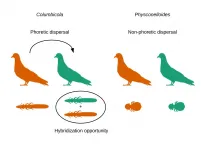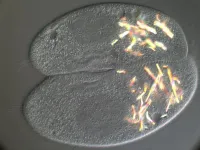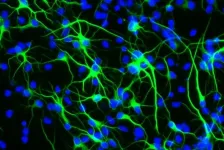INFORMATION:
Other contributors to this work include Tao Shen, Wei Wang, Wolong Zhou, Ilsa Coleman, Qinbo Cai, Bingning Dong, Michael M. Ittmann, Chad J. Creighton, Yingnan Bian, Yanling Meng, David R. Rowley, Peter S. Nelson and David D. Moore. The authors are affiliated with one or more of the following institutions: Baylor College of Medicine; Fred Hutchinson Cancer Research Center, Seattle; Adrienne Helis Malvin Medical Research Foundation, New Orleans and University of Washington, Seattle.
This research was supported by grants from the Department of Defense Congressionally Directed Medical Research Programs (W81XWH-13-1-0162, W81XWH-13-1-0163, W81XWH-17-1-0043) and the Cancer Prevention Research Institute of Texas (RP130651).
Targeting MAPK4 emerges as a promising therapy for prostate cancer
2021-02-19
(Press-News.org) The battle against late-stage prostate cancer might have found a potential new strategy to combat this deadly disease. Research led by Baylor College of Medicine reveals in the Journal of Clinical Investigation that the enzyme MAPK4 concertedly activates androgen receptor (AR) and AKT, molecules at the core of two cellular signaling pathways known to promote prostate cancer growth and resistance to standard therapy. Importantly, inhibiting MAPK4 simultaneously inactivated both AR and AKT and stopped cancer growth in animal models. The findings open the possibility that targeting MAPK4 in human prostate cancer might provide a novel therapeutic strategy for this disease that is the second leading cause of cancer death in American men.
"Scientists already knew that both the AR and the AKT pathways can drive prostate cancer," said corresponding author Dr. Feng Yang, assistant professor of molecular and cellular biology and member of the Dan L Duncan Comprehensive Cancer Center at Baylor. "One complication with targeting AR (for instance, with medical castration therapy, including the most advanced agents such as enzalutamide, apalutamide and abiraterone) or AKT is that there is a reciprocal crosstalk between these pathways. When AR is inhibited, AKT gets activated, and vice-versa, therefore tackling these pathways to control cancer growth is complex."
In previous work, the Yang lab studied the little-known enzyme MAPK4.
"One interesting aspect of MAPK4 is that it is rather unique because it does not work as conventional MAPK enzymes do," Yang said. "To our knowledge, we are one of the few groups studying MAPK4 and the first to uncover its critical roles in human cancers."
In their previous study, Yang and his colleagues discovered that MAPK4 can trigger the AKT pathway, not only in prostate cancer but in other cancers as well, such as lung and colon cancers.
In the current study, the researchers found that MAPK4 also activates the AR signaling pathway by enhancing the production and stabilization of GATA2, a factor that is crucial for the synthesis and activation of AR.
Further experiments showed that MAPK4 triggered the concerted activation of both AR and AKT pathways by independent mechanisms, and this promoted prostate cancer growth and resistance to castration therapy, a standard medical treatment for advanced/metastatic prostate cancer. Importantly, genetically knocking down MAPK4 reduced the activation of both AR and AKT pathways and inhibited the growth, including castration-resistant growth, of prostate cancer in animal models. The researchers anticipate that knocking down MAPK4 also could reduce the growth of other cancer types in which MAPK4 is involved.
"Our findings suggest the possibility that regulating MAPK4 activity could result in a novel therapeutic approach for prostate cancer," Yang said. "We are interested in finding an inhibitor of MAPK4 activity that could help better treat prostate cancer and other cancer types in the future."
ELSE PRESS RELEASES FROM THIS DATE:
Parasites' dispersal capacity and rates of genetic introgression--a study
2021-02-19
The results, recently published in the journal Communications Biology, have important applications in the field of coevolutionary biology
The physical movement of species determines their potential scope to leave their primary ecosystem behind in the quest for new niches in which to survive or reproduce--a decisive factor for the processes that determine their genomic characteristics.
Researchers from the University of Granada (UGR) and the University of Illinois (UI) have, for the first time, analysed the relationship between this potential for movement in different species of parasites--their dispersal capacity--and their levels of genetic introgression. Introgression--the gradual movement of genes from one species into the gene pool of another--affects the proportion of regions of ...
The melting of large icebergs is a key stage in the evolution of ice ages
2021-02-19
A new study, in which the Andalusian Earth Sciences Institute (IACT) (CSIC-UGR) participated, has described for the first time a key stage in the beginning of the great glaciations and indicates that it can happen to our planet in the future. The findings were recently published in the scientific journal Nature
The study claims to have found a new connection that could explain the beginning of the ice ages on Earth
Antarctic iceberg melt could hold the key to the activation of a series of mechanisms that cause the Earth to suffer prolonged periods of global ...
Sex that is not for reproduction
2021-02-19
The mating process is one of the most important mechanisms for maintaining genetic variation in natural populations. The emergence of sexual reproduction turned out to be the most important evolutionary innovation that facilitated the evolution of eukaryotes. Paramecium is a well-known genus of ciliated protists with a complex system of 'sexes', or mating types. Paramecium reproduces asexually, by binary fission, which is not related to the mating process. During conjugation, Paramecium of compatible mating types exchange haploid nuclei, equivalent to gametes. The nuclei of each organism ...
Data show lower daily temperatures lead to higher transmission of COVID-19
2021-02-19
LOUISVILLE, Ky. - The SARS-CoV-2 pandemic has caused tremendous upheaval, leading to more than 2.3 million deaths worldwide and 465,000 in the United States. Understanding the impact of seasonal temperature changes on transmission of the virus is an important factor in reducing the virus's spread in the years to come.
SARS-CoV-2 belongs to a large family of human coronaviruses, most of which are characterized by increased transmission in cooler, less humid months and decreased transmission in warmer, more humid months. With this understanding, researchers at the University of Louisville's Christina ...
'In the blink of an eye' statistics
2021-02-19
HSE University researchers Yuri Markov and Natalia Tyurina discovered that when people visually estimate the size of objects, they are also able to consider their distance from the observer, even if there are many such objects. The observers rely not only on the objects' retinal representation, but also on the surrounding context. The paper was published in the journal Acta Psychologica.
Multiple studies in visual 'ensemble statistics' have proven that humans are able to visually estimate the statistical characteristics of multiple objects in a fast and rather ...
Mayo Clinic researchers develop test to measure effect of breast cancer gene variants
2021-02-19
ROCHESTER, Minn. ? Researchers at Mayo Clinic have combined results from a functional test measuring the effect of inherited variants in the BRCA2 breast and ovarian cancer gene with clinical information from women who received genetic testing to determine the clinical importance of many BRCA2 variants of uncertain significance (VUS). The findings were published today in a study in the American Journal of Human Genetics.
"There are 4,565 different VUS in the BRCA2 gene listed in the National Institutes for Health (NIH) Clinical Variant Database," says Fergus Couch, Ph.D., a breast cancer researcher at ...
Study reveals how a longevity gene protects brain stem cells from stress
2021-02-19
A gene linked to unusually long lifespans in humans protects brain stem cells from the harmful effects of stress, according to a new study by Weill Cornell Medicine investigators.
Studies of humans who live longer than 100 years have shown that many share an unusual version of a gene called Forkhead box protein O3 (FOXO3). That discovery led Dr. Jihye Paik, associate professor of pathology and laboratory medicine at Weill Cornell Medicine, and her colleagues to investigate how this gene contributes to brain health during aging.
In 2018, Dr. Paik and her team showed that mice who lack the FOXO3 gene ...
Location tracking apps and privacy implications
2021-02-19
How much personal information can our phone apps gather through location tracking? To answer this question, two researchers - Mirco Musolesi (University of Bologna, Italy) and Benjamin Baron (University College London, UK) - carried out a field study using an app specifically developed for this research. Through the app employed in the study - published in Proceedings of the ACM on Interactive, Mobile, Wearable and Ubiquitous Technologies - researchers were able to identify which kind of personal information the app extracted and its privacy sensitivity according to users.
"Users are largely unaware of the privacy implications ...
What impact will robots and autonomous systems have on urban ecosystems?
2021-02-19
The University of Leeds has coordinated a study with 170 experts from 35 countries, including E.T.S. Agronomic Engineering lecturer Luis Perez Urrestarazu. The study conclusions have just been published in the journal Nature Ecology & Evolution.
The researchers highlighted opportunities to improve the way green spaces are monitored and maintained and helping people to interact with and appreciate the natural world around them. Similarly, as autonomous vehicles become more widely used in cities, pollution and traffic congestion are set to fall.
But they also warn that advances in robotics and automation could be harmful to the environment. They may, for example generate new sources of waste and pollution, with potentially substantial negative implications for urban nature. Cities may ...
Basque ethnic identity and collective empowerment are associated with wellbeing
2021-02-19
Social identity is a factor linked to wellbeing and community participation. Various studies have demonstrated the link existing between ethnic identity and empowerment and that the interaction between both of them leads to a rise in the indices of wellbeing and community participation. However, the nature of these relationships may be determined by the fact that the individual perceives his or her own group as a minority one and/or one that is subject to discrimination. In fact, these relations emerge mostly in groups that find themselves in a minority situation and/or one of discrimination, but not in groups that are more hegemonic or in the majority.
To further ...





